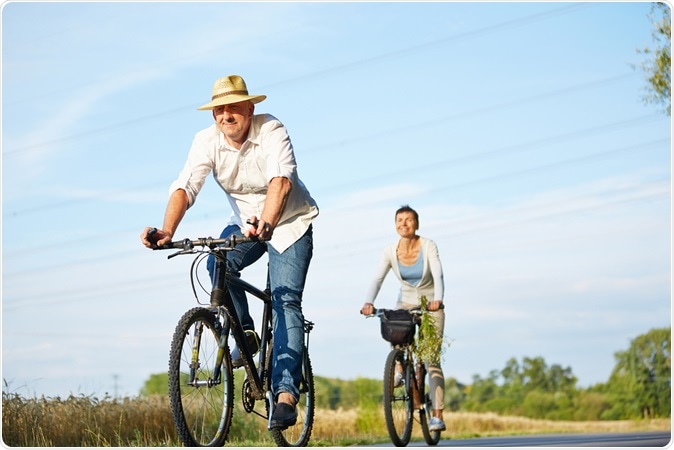Not surprisingly, a new study has shown that keeping active can keep the body young and healthy. The study comes from the researchers at the University of Birmingham and King's College London who were looking at the health of older adults who had been exercising most of their adult lives. The research has been reported in two papers published this week in the journal Aging Cell.

Senior couple cycling with bikes in nature in summer. Image Credit: Robert Kneschke / Shutterstock
The team of researchers looked at 125 amateur cyclists between ages 55 and 79 years excluding those who were smokers, heavy drinkers and those with high blood pressure or medical problems. Of these 84 were male and the rest females. They found that the men could cycle 100 km in under 6.5 hours while the women could cycle 60 km in 5.5 hours. These participants were compared with adults of similar age group who did not exercise regularly. This was the control group (total 130 participants) that included 75 healthy individuals between ages 57 and 80 years and 55 healthy adults aged between 20 and 36 years. All participants underwent tests and evaluations at the laboratory.
Results revealed that muscle mass loss and strength loss did not occur in the exercising group. Body fat and cholesterol also did not rise in these individuals. The testosterone levels among the men who exercised also did not fall and thus male menopause was also delayed. The immune system stayed younger and healthier among those who exercised. For example thymus – an organ that makes immune cells called the T cells in the twenties and thereafter shrinks with age, remained healthy and active in these older adults who regularly exercised.
According to Professor Janet Lord, Director of the Institute of Inflammation and Ageing at the University of Birmingham, this study proves what Hippocrates said in 400 BC – exercise being man’s best medicine. She said that this important message has been “lost over time” and we have become more sedentary now. What was an important takeaway from this study she explained, was that ageing does not automatically make humans frail, lack of exercise on the other hand is associated with the problems of ageing.
Professor Lord said that this research hopefully would reinforce the need for regular exercise among general population. She said that at present people are living longer but not healthier and this can be changed only through regular exercise.
According to Dr Niharika Arora Duggal from the team, the “third age of man” need not be something to be “endured” but may be “enjoyed”. Professor Stephen Harridge, Director of the Centre of Human & Aerospace Physiological Sciences at King's College London reiterated the value of long term exercise on healthy ageing. He said the bodies of these participants were ageing optimally and are generally free of the problems that are caused due to lack of activity. Norman Lazarus, Emeritus Professor at King's College London added that this exercise was mainly to stay healthy and not to the tune of athletes. It raised their “physiological capabilities”. He said exercise should be suitable and enjoyable. Dr. Lazarus is 82 and is a cyclist himself. He participated in this study as a subject as well. He said, “If exercise was a pill, everyone would be taking it.”
References:
- Pollock et al (2018). 'Properties of the vastus lateralis muscle in relation to age and physiological function in master cyclists aged 55 - 79 years'. http://onlinelibrary.wiley.com/doi/10.1111/acel.12735/abstract
- Duggal et al (2018). 'Major features of Immunesenescence, including Thymic atrophy, are ameliorated by high levels of physical activity in adulthood.' http://onlinelibrary.wiley.com/doi/10.1111/acel.12750/full